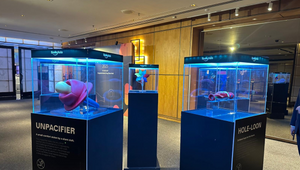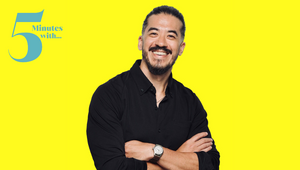
Bossing It: Prioritising the Important Over the Urgent With Andreas Krasser

Andreas Krasser began his career with Innocean in Seoul, Korea where he was part of the research team before leaving to make his mark at Lufthansa. He then spent time with Tribal World Korea and DDB Korea as a strategist and then lead planner before being made CEO of the group's Hong Kong office in 2019.
Aside from his professional career Andreas is a published author in the field of cross-cultural consumer research, and an avid writer for industry publications such as ClickZ, Marketing Magazine, Campaign Brief Asia, Campaign Asia, and the WARC Blog. He also frequently lends his views on stage at international marketing conventions such as Advertising Week in Tokyo, DigiCon in Manila, and ADSTARS in Busan.
Andreas is fluent in German, English, Korean, and claims to know how to get himself into trouble in Russian. In his free time, he likes to illustrate comics, pretend to lift heavy weights, and film Arts & Crafts YouTube tutorials with his little daughter.
LBB> What was your first experience of leadership?
Andreas> I’d love to say that it was very early on in my childhood, and that I always felt I was destined to lead…but my first experience of “leadership” didn’t actually happen until midway through my career, when I was unexpectedly thrown into a situation where I had to supervise a bunch of junior planners. When I moved on to my next job, they made me quite a nice farewell video…so, I guess they at least didn’t hate me.
LBB> How did you figure out what kind of leader you wanted to be – or what kind of leader you didn’t want to be?
Andreas> Honestly, I am probably still figuring it out. I’ve had bosses in the past that showed me both the kind of leadership I respected, and also the kind I knew I wasn’t really on board with. All those experiences cemented two things in my mind: first, it became very obvious to me that I didn’t want to be a leader that relied on corporate hierarchies. At the same time though, without wanting anything remotely resembling a dictatorship, I also understood I didn’t want to be a leader that couldn’t make any decisions.
LBB> What experience or moment gave you your biggest lesson in leadership?
Andreas> I don’t think there was one specific moment in time, but more the accumulative experience over my first 12 – 18 months as CEO of DDB Group Hong Kong, which started off in a time of social unrest in Hong Kong, and was immediately followed by Covid-19. Let’s just say it’s been an emotional roller coaster ride. I do believe it has been one that has taught me a few very valuable lessons though, that I probably would have otherwise taken years to gain – especially in humility.
LBB> Did you know you always wanted to take on a leadership role? If so how did you work towards it and if not, when did you start realising that you had it in you?
Andreas> When I started my career in strategy, I just wanted to create great work. Period. It was only later that I discovered I also had a bit of a knack for the people part of the job. This actually started with running co-create workshops within the agency as well as with our client partners – I found it very gratifying to see that I was capable of facilitating a collaborative process that led to really interesting outcomes and ideas – ideas I would have never been able to get to by myself. Subsequently, my superiors started putting me on jobs and assignments for my soft skills rather than my strategy skills, so I thought: “Hey, let’s maybe check this leadership thing out…”
LBB> When it comes to 'leadership' as a skill, how much do you think is a natural part of personality, how much can be taught and learned?
Andreas> I sincerely hope that some of it is a skill that can be learned…otherwise I’m f****d! In all seriousness though, I think leadership might come “easier” to some than others. So yeah, part of it certainly is personality and I think a lot of it has to do with decisiveness. But many other aspects of leadership can be taught, as long as there is a willingness to learn (which all goes back to personality again, I suppose).
LBB> What are the aspects of leadership that you find most personally challenging? And how do you work through them?
Andreas> TBWA New York Group’s Rob Schwartz once said that leadership is all about ‘how you show up’. Now while I’m naturally optimistic, the past year and a half has made it really difficult to always rock up with a smile on my face…. But really, I’ve found that it’s more about showing up with a plan, communicating that plan well, and being open and flexible enough to admit when things are not necessarily going according to plan too.
LBB> Have you ever felt like you’ve failed whilst in charge? How did you address the issue and what did you learn from it?
Andreas> Ha – pretty much all the time! Mostly so in the past few months though – 2021 was off to a rough start, and in many instances has proven to be even tougher than 2020. While I felt I did pretty ok last year, it all somehow started to catch up with me at the beginning of 2021, and instead of making decisions for the long-run, I let myself get sucked into my comfort zone, which as strange as it may sound, was just focusing on everything that was urgent. It took a bit of time, and a few heart-to-heart talks with some of my management team members, to pull myself out of ‘firefighting mode’, and refocus on the important over the urgent.
LBB> In terms of leadership and openness, what’s your approach there? Do you think it’s important to be transparent as possible in the service of being authentic? Or is there a value in being careful and considered?
Andreas> Definitely openness. Generally speaking, I believe there’s no such thing as over-communicating. It’s important to keep the entire agency updated on what’s going on. And it’s not just about sharing the good news, but also the more difficult, such as lost pitches for example, which can still turn into a valuable learning experience for the wider group. I also regularly share updates on the financial performance of the company, providing everyone with an honest assessment about what shape the agency is in.
LBB> As you developed your leadership skills did you have a mentor, if so who were/are they and what have you learned? And on the flip side, do you mentor any aspiring leaders and how do you approach that relationship?
Andreas> I have had, and still have, a few people I consider mentors – they range from previous and current bosses and bosses’ bosses, to peers, and other agency heads who my friend (and mentor) Tony Harris calls members of the ‘Lonely Club’. However, the person who has been the biggest influence on me lately is someone I was supposed to mentor in the first place: Mehak Jaini from DDB Mudra Group. Mehak’s supervisor asked me a year ago if I was willing to have regular Teams sessions with her so she could ask me questions in regards to her career development. But somehow, after every chat, I feel I am the one who got more out of it – I think, listening to Mehak’s challenges and trying to give her guidance on those, also helps me to reflect on my own obstacles, and more importantly, come to terms with some of my mistakes.
LBB> It's been a really challenging year - and that's an understatement. How do you cope with the responsibility of leading a team through such difficult waters?
Andreas> There really isn’t a playbook. And with Covid waves coming and going, things are in constant flux. So, the answer is: it depends. One thing I do try to do more consistently though is to create little mental escapes for the office – something to give our people the opportunity to take a break from negative headlines and just experience a bit of carefree fun. So, last year, we have made it a habit to celebrate our wins, big or small. I’ve learned that during a crisis, it’s often the small things that can make a difference—albeit for a short moment.
LBB> This year has seen the industry confronted with its lack of action/progress on diversity and inclusion. As a leader how have you dealt with this?
Andreas> The honest answer: I haven’t dealt with it enough. Which saddens me, because everyone who knows me, knows that I strongly believe in diversity as a force of creativity. While I have promoted another female leader from the office into the management team, and while we have created a new creative partner structure where five of the seven senior creative leaders are female, we still have a very long way to go. Not only in terms of our senior leadership gender ratio, but also when it comes to creating a more culturally diverse team, which given my own mixed cultural background, is something very close to my heart.
LBB> How important is your company culture to the success of your business? And how have you managed to keep it alive with staff working remotely in 2020?
Andreas> In Hong Kong, we were lucky enough to avoid major lockdowns throughout 2020. While we sporadically had to WFH, most of the year we were actually able to work in the office. While this was obviously a plus, uncertainty and fear were still constant “companions” of ours. So, in terms of culture, I tried to step up our internal comms through internal newsletters, my regular emails to all staff to keep everyone up-to-date on management decisions, socially distanced town hall meetings, and the occasional happy hour either via Teams or in person at the office.
LBB> What are the most useful resources you’ve found to help you along your leadership journey?
Andreas> Mentors are great to give you advice based on their own experiences; mentees are great because they help you to practice some self-reflection. However, the best resource so far has been the people around me who had no problem telling me when I was neglecting my leadership duties or drinking too much of the Kool-Aid.















